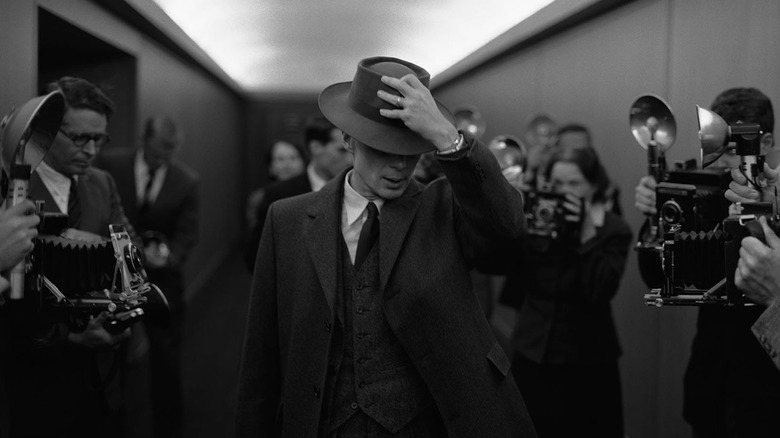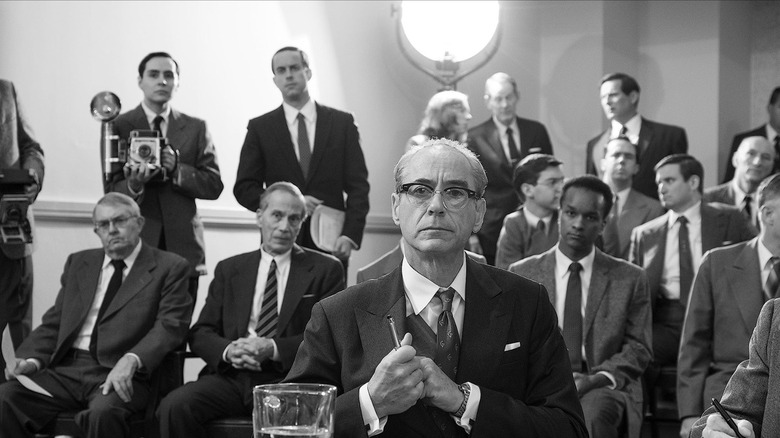Alden Ehrenreich's Oppenheimer Character Doesn't Have A Name For A Specific Reason
We may receive a commission on purchases made from links.
It seems a little trite and obvious to put into words, but the film "Oppenheimer" had to be made carefully when it came to the movie's optics. The ostensible protagonist of the biopic is J. Robert Oppenheimer (played by Cillian Murphy), a man whose life and legacy are fraught with numerous political, social, and moral issues that cannot be easily resolved in reality, let alone a single motion picture. Added to that is writer/director Christopher Nolan's unique approach to telling his story, which revolves around adopting an intensely subjective point of view, an aesthetic that began with the movie's script being written in the first person (from Oppenheimer's perspective) and continued as far as the depiction of a number of surreal, dreamlike visions that Oppenheimer experiences during the film.
In adapting the book "American Prometheus" by Kai Bird and Martin J. Sherwin, Nolan sought to include as many real-life figures in the film as possible to accurately tell Oppenheimer's story, casting them with a series of recognizable actors in order to help distinguish them for the audience. One actor who is certainly recognizable within the ensemble cast is Alden Ehrenreich, best known for the Coen brothers' "Hail, Caesar!" and Ron Howard's "Solo: A Star Wars Story." Although Ehrenreich's casting fits Nolan's milieu for the film, his character does not, as he's one of the few speaking roles in the movie that is not based on a historical figure. Instead, Nolan uses him in a different way, taking advantage of his separation from history by making him a proxy character for the audience, a choice that allows him to become particularly vital during the plot line concerning Lewis Strauss (Robert Downey, Jr.).
Channeling Jimmy Stewart
A vast majority of the events in "Oppenheimer" are a matter of historical record. So while Christopher Nolan couldn't invent any wildly surprising plot twists without totally diverging from history, he could — and did — structure the movie in a way that's dramatically tense and surprising. One of the ways he does this is by intercutting the story of Strauss attempting to be confirmed as the U.S. Senate's Secretary of Commerce with Oppenheimer working on building the atomic bomb a good 15 years earlier and the scientist's security clearance hearing five years earlier, with Oppenheimer's story being presented in color and Strauss' in black-and-white to help distinguish the perspectives.
Most of Strauss' scenes take place in the backrooms of the Senate confirmation proceedings, allowing Nolan to insert Alden Ehrenreich's character (known only as "Senate Aide") to function as a soundboard for Strauss and a stand-in for the audience. According to the book "Unleashing Oppenheimer: Inside Christopher Nolan's Explosive Atomic-Age Thriller" by Jada Yuan, Nolan was impressed at the actor's incisive understanding of his role in the film:
"Alden fully understood that he's a full-fledged character in the drama of the film and a very important one. His relationship with Strauss as it develops is an important guide for the audience in terms of judging and assessing what they're being told."
Apparently, Ehrenreich saw his character as being akin to Jimmy Stewart's titular character in 1939's "Mr. Smith Goes to Washington," someone who begins the film as an idealist but discovers to his dismay how much corruption exists in the government. As Ehrenreich observed, his character is allowed to learn about Strauss and Oppenheimer along with the audience:
"I'm asking Strauss all these questions about Oppenheimer and their history for the purposes of my job, but at the same time, I am learning as the audience is learning that there might be more to this story, and there's a more sinister element to his history with Oppenheimer."
Selling the twist
In addition to the plot of "Oppenheimer" being surprising to those without foreknowledge of the historical facts, Nolan's structuring of the film allows him to build in a plot twist. As Oppenheimer is ruthlessly grilled by the men at his security clearance hearing, Strauss reveals (five years later in the plot, almost simultaneously in the film itself) that "sinister element" Ehrenreich mentioned: It was he who orchestrated Oppenheimer's downfall, for no better reason than Strauss' own misplaced bitterness toward the man and rampant insecurities within the scientific community in general.
Complementing Robert Downey Jr.'s commanding performance during this revelation is Alden Ehrenreich, allowing the moment to land with maximum dramatic and emotional impact. As casting director John Papsidera observes in Yuan's book:
"We wanted them to feel like equals, so that Strauss had to give him respect. It's a big moment when the Senate aide turns on Robert's character. You needed somebody to handle that moment."
You've got a friend in me
While Lewis Strauss and the "Senate Aide" are undeniably antagonistic toward each other, if not fully-fledged enemies by the conclusion of "Oppenheimer," the opposite was true of the actors who played them. According to Robert Downey Jr., his relationship with Alden Ehrenreich on set was one of the "great, great joys" for him while making the film. The actor elaborated:
"I made a great friend in him. I don't imagine Chris [Nolan] was like, 'I wonder who Downey would like to have as a friend?' But he just happened to pick this younger, super talented actor who is just so great."
Some writers, audience members, and even Nolan himself have likened "Oppenheimer" to a horror movie, what with its tension, ambiguity, and moral quandaries. It's a typical occurrence for actors working on a horror film to bond with each other on set in order to have a comfortable jumping-off point to get to the anxiety and other harsh emotions their characters need to display. Just as Ehrenreich apparently provided that touchstone for Downey Jr., the "Senate Aide" provides that for the audience of the film. After all, it's not accidental that his character is the one to mention the "junior senator from Massachusetts" who provides a bit of hope for the soul of America after the events of the film. The "Senate Aide" may be less idealistic than when he began the movie, but for all intents and purposes, he is us, hoping that we may be able to find our way as a country again.



